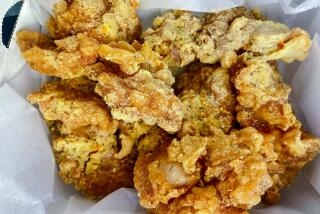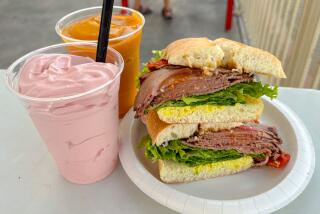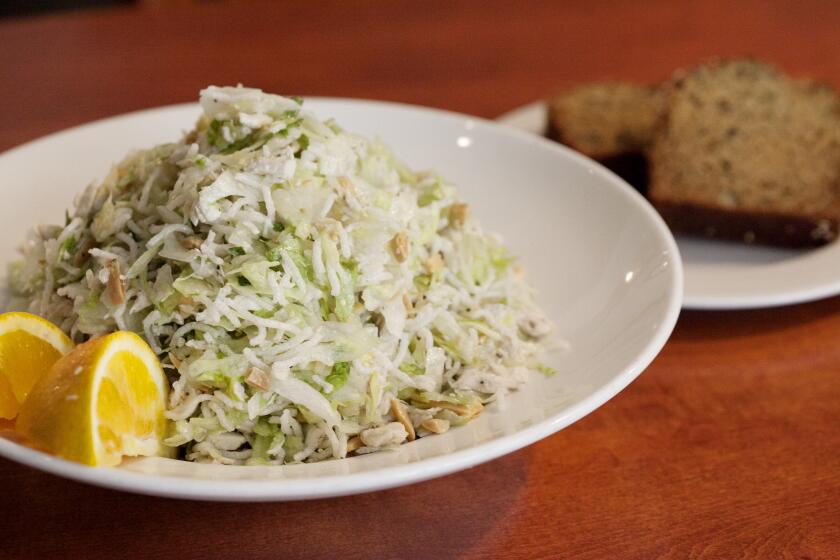A New Spin on Rotisserie Meat
- Share via
SALISBURY, Md. — Has rotisserie chicken, once the darling of the grocery store, lost its sizzle?
The ready-cooked birds flew off grocers’ shelves in the 1990s, but sales have begun leveling off, industry estimates show. A growing number of grocers worry that customers are getting a little bored of the chickens, even in lemon pepper or barbecue flavors, and in response they are throwing new meats on the skewer. Coming soon: rotisserie pork loins and beef.
“You don’t want to eat chicken every day,” said Barry Loy of Supermarket Operations, an eight-store grocery chain based in Mississippi. His stores still sell rotisserie chickens, but now they are experimenting with hot baby-back ribs, smoked sausage and ham. “It’s probably growing faster than the chicken,” he said of the beef and pork, even though they cost more.
The competition from other meats has not gone unnoticed by chicken producers. Although about 750 million rotisserie chickens were sold last year -- two-thirds of them in grocery stores -- sales growth of the birds was about 3%, about the same as chickens overall, according to the National Chicken Council in Washington, D.C.
“It was growing in the double digits there for a while,” said the council’s vice president, Bill Roenigk.
The slackening growth is being tackled in a test kitchen in Salisbury, headquarters of Perdue Farms Inc., the nation’s third-largest chicken producer.
Cutting into a steaming chicken nearly black with a spice rub of garlic, basil, rosemary and oregano, Perdue product marketing manager John Moore said shoppers still loved rotisserie chickens. They just want their birds to have more zip.
“We’re thinking more robust flavors,” Moore said. “Americans are becoming more sophisticated in their palates.”
So Perdue is rolling out a spicier Italian flavor, called Tuscan, and already has tested a line for Latino shoppers called Perdue La Cocina.
One large grocer, Ralphs parent Kroger Co., has regional chicken flavors such as tandoori and apricot glaze. Spokesman Gary Rhodes said the grocer had not ruled out selling other rotisserie meats.
“We believe there may be opportunities to expand into other fresh meats,” he said.
Andy Seymour, a vice president of sales and marketing for Perdue’s deli line, conceded that the rotisserie chickens offered in grocery stores had changed little since the concept took off more than a decade ago.
“There’s not been a lot of new flavors in that category, and there’s a real need for that,” he said.
It didn’t used to be this way. Starting in the late 1980s, driven by the popularity of rotisserie chickens in restaurants such as Boston Market, chicken processors started pre-marinating birds so grocery stores could join the trend. A few years later came different flavors -- cue the lemon pepper and barbecue -- and time-pressed shoppers snapped them up for easy dinners.
“It answers the question: What’s for dinner?” said Perry Fleming of Jubilee Festival grocery stores in Minnesota and Wisconsin. “There’s very little time involved with taking them home and serving them. People see it as healthy and convenient.”
But maybe grocers haven’t done a good job selling the birds, said food industry analyst Phil Lempert, editor of SupermarketGuru.com.
“It has to be theater,” Lempert said, noting that high-end stores that kept their rotisserie cases gleaming had maintained sales growth.
“In traditional supermarkets, you look at that rotisserie case and you get sick to your stomach,” he said. “They haven’t done a good job keeping it clean and making it appealing.”
New meats will give chickens more competition. Lempert noted the Brazilian steakhouse trend that has people packing restaurants that serve hot cuts of steak and pork.
“We’re going to see more rotisserie everything,” he said.
More to Read
Eat your way across L.A.
Get our weekly Tasting Notes newsletter for reviews, news and more.
You may occasionally receive promotional content from the Los Angeles Times.










